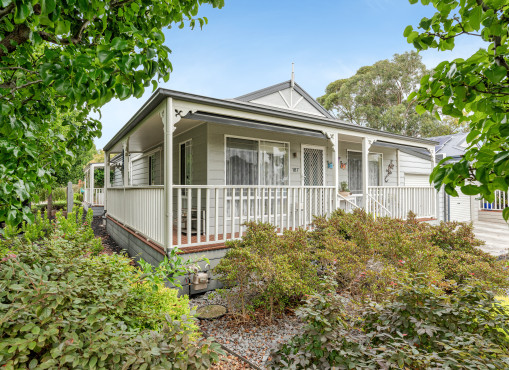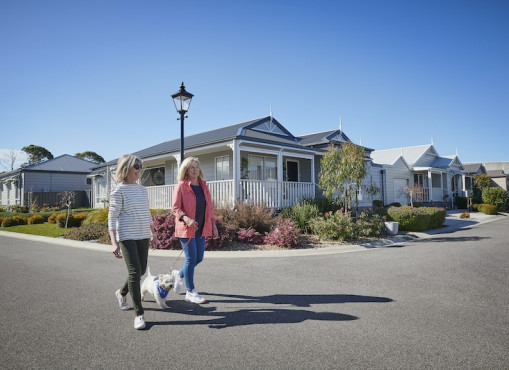- Home
- /
- All blog articles
- /
- Is $2 million enough to retire at 60 in Australia?

Is $2 million enough to retire at 60 in Australia?
It’s a popular idea that you need not only one, but TWO million dollars in your bank account to be ready to retire early. Followed by a lot of “???” popping up over your head thinking: Will that be enough to start retiring at 60 though?
Retiring earlier means you have less time to contribute to your age pension and superannuation. Giving up work at 60 is seven years earlier than the average retirement age. But does $2 million make up for that income loss? And how much super do you need to retire at 60?
We want to clean up the rumours and break down how much you can count on for a comfortable but early retirement.
Is $2 million enough to Retire at 60?
The universal answer is: it depends.
We know, we know. That’s not a very helpful answer. But as it is with so many scenarios, how much super you need to retire at 60 truly depends on your personal retirement plan and goals. What might be comfortable for you, can be luxurious for others. Let’s play a little quiz to get a closer picture of your situation – right answers only!
- Are you trying to survive on $2 million as a single person or in a household with a partner?
- Do you aim to live in your own property or renting out a place?
- Do you have pets or will have some once retired?
- Did you join a club or want to take up an expensive hobby?
- Is travelling your thing and you got some places pinned on the world map to explore?
- Are home-cooked meals on the daily menu or visits to your favourite restaurants
Now that you have your future vision in front of you, how much do you think you will need to maintain that lifestyle? Let’s make it a little easier: how much is your current annual salary and what are your monthly expenses? If the answer to both of these is $2 million dollars, then we are preeetty sure it won’t be enough to get through the entirety of your retired life. But that’s for another time.
More realistically, whatever your annual income is, including any spendings you have on average will give you a good indicator about how much you are going to need for your retirement. Even though you will have much more time to go on adventures, which want to be paid for, you will have cut down on other costs too. Your spending routine will most likely look similar on a day to day basis for the majority of retired life.

Besides, you might already own a property or are planning to downsize and therefore don’t need to worry about paying rent anymore. If that’s the case, you save up to 30% of your income every month for other things other than paying off your mortgage.
Then there is the beloved age pension and other government incentives. Whether you are eligible to receive any government support starts with your age and it can be tricky to access any of it being younger than the average retirement age. Which brings us to our next question.
Have you got a retirement savings plan?
Your retirement plan of course includes all the things you want to take on, now that free time comes in extra value packs. But a fun and comfortable lifestyle needs some financial thought as well and your retirement savings plan usually has a big role to play.
Especially if you think about retiring early at 60 years old, your savings are even more important. To be eligible for age pension, you need to be at least 67 years old. So you can’t count on it for a couple of years!
Now let’s not break out in a sweat, shall we? There are a few things you might already have in place or are planning to go with. Some inspiration includes:
- Setting up a savings account
- Choose insurance cover (health, life, etc.)
- Feeding your superannuation (incl. extra contributions)
- Holding or selling shares
- Investing in crypto currency
- Owning property
- Expecting inheritance
Whichever suits your plans and income is up to you, but it’s a good idea to review what you currently got locked in and what else you could do to get a step closer to your desired retirement outlook.
*Source: Australian Government Services Australia, as of 24 April 2024.
What does life look like in retirement with $2 million in the bank?
Here’s a little maths experiment. In order to know how far $2 million can take you, you will need to break down the whole sum into your approximate life span. We love going by average numbers, so here it goes:
Assuming you retire at the age of 60 and make it to 85 (fingers crossed you’ll celebrate the 100 too!) that’s 25 years to cover financially. With $2 million in the pocket, it comes to about $80,000 per year or $6,667 per month to spend. And we’re just talking about savings alone!
Granted, with that much in the bank, we are quite certain that you are over the asset limit to receive the age pension for a while. However, it should also be enough to cover your expenses and provide you with an income as if you were still working – potentially even more.
With $2 million in the bank, you could afford a very comfortable lifestyle with lots of travelling and little luxuries every month. Picking up a new hobby or having a pet at home should also be an easy financial choice. Donating to charity or volunteering is also an affordable option. But again, it all depends on how you plan to get through retirement on a daily basis.
If we assume that you are not part of the group of people that managed to save two million dollars by the age of 60, (no judgement, that’s a lot of money to put aside) there are more factors to consider. As a homeowner with a paid off mortgage, you won’t have to deal with the same costs throughout retirement for your home. In fact, when you downsize your home you are likely to reduce your overall bills and costs, as well as having the chance to free up equity by selling your bigger home – which then can be put back into use for your retirement savings.
Can you access your superannuation if you retire at 60?
You can access your superannuation as soon as you reach the preservation age and start retirement. The preservation age depends on your date of birth and generally allows you to access your super earlier than your age pension. Here are the two ways:
- If you were born from 1 July 1964 onwards, your preservation age is at 60 for you to fetch your super.
- If you were born on 30 June 1964 or earlier, your preservation age starts at 59 or younger for you to access your super.
If you fit the conditions for release, you are good to go! There are also different reasons why you might be able to access your super earlier, such as financial hardships, due to medical reasons or on compassionate grounds.
*Source: Australian Taxation Office, as of 2 August 2023.
What about accessing my super in semi-retirement?
Working or retirement. Why not both? If you are not ready to go all in with the retirement card yet, either because it’s not financially viable or you like to continue taking up an occupation, a transition plan might be a good idea. In other words a transition to retirement income stream (TRIS).
Once you reach your preservation age, you have the option to open up a different income stream from your super. You can reduce your working hours or decide on particular work days and use the newly-won free time to pick up other activities that are more your style, all without reducing your income.
Or you can choose a salary sacrifice scheme to put the excess into your super account. Each financial year, you can withdraw between 4-10% of your super balance if you are younger than 65 years old. There are also ways to take out a bigger sum of your super balance instead of choosing a transition method.
If you are not sure which way to go, ask a financial advisor for help in your particular case to squeeze out every coin possible.

How does downsizing help with my savings?
From reducing unused space and the stress when keeping up with maintenance, saving costs on bills and freeing up time for the real fun things in life – downsizing your family home has plenty of benefits.
Choosing an appropriately-scaled home can also free up a big chunk of equity. In the case of Lifestyle Communities®, here is the deal: selling your current home and instead buying a downsized one for 75-80% of the median house price leaves you potentially with more pocket money. You also have the option to save on stamp duty and council rates, as well as water rates and cheaper insurance and maintenance costs in a Lifestyle Communities® home.
With The Resort Fee*, any gardens, maintenance of common areas or resort-style facilities and access to Community Managers are taken care of.
*The Resort Fee refers to the Weekly Site Fee in the purchase agreement.
Besides cutting down on the dollars, you also gain plenty of exciting facilities right next door and a fun community close by. Taking a morning swim, having lunch in the Clubhouse, watching the latest blockbuster in a private cinema, reading up on your favourites in the library or moving those pretty legs with a gym session is now extra easy when moving into these community-focused houses. Maybe you don’t need to go on holiday anymore: you are already living it at your own home.
Maximise your savings and consider downsizing with Lifestyle Communities®. More cash to spend on your lifestyle, health and retirement plans!
So, what do you think?
Do you need $2 million in the bank to retire at 60? As everything in life, it depends on what you are looking for and what is available to you. If you got some to spare, it surely can’t hurt. But if you are just looking for a comfortable and secure retirement lifestyle, there are many ways to achieve just that.
We might be biased, but downsizing real estate is our number one recommendation to get ready for retirement. And you can start your downsizing journey earlier to – your 50s, whether fully working or semi-retired, are a sweet spot to make the move, giving you enough time to make the most of the different activities.
Browse through our high-quality homes for sale in Victoria to touch base with your potential future home? Let us know if you are ready for an inspection or need some more information.


